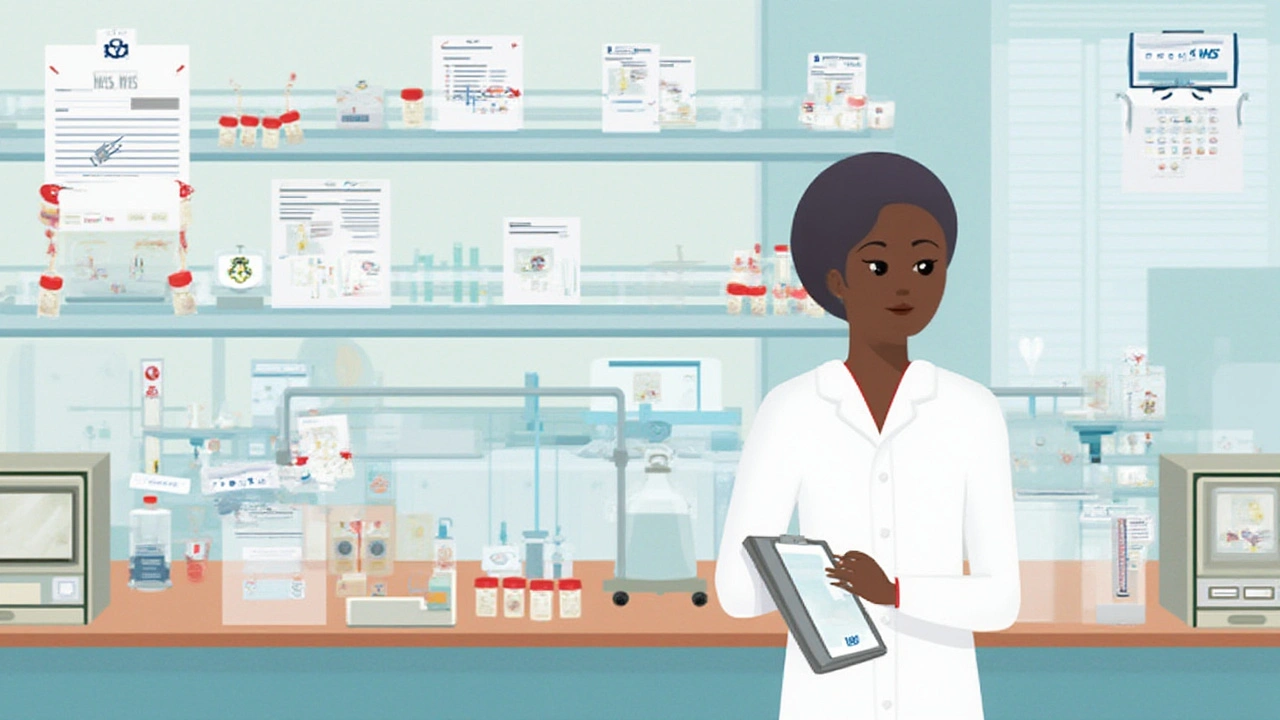Imagine finally finding relief for a medical condition, only to learn the perfect dose, form, or ingredient you need just doesn’t exist on the pharmacy shelf. Sounds like a headache, right? That’s where a compounding pharmacy steps in—an old craft making a surprising comeback. These aren’t your average chemists behind the counter. They blend science, skill, and a bit of magic to tailor-make medication when off-the-rack solutions just don’t fit.
What Exactly is a Compounding Pharmacy?
The idea of mixing up medicines for specific people isn’t new. In fact, before giant companies mass-produced pills and ointments, pharmacists were known as compounders. Back in the day, nearly every pharmacy was a compounding pharmacy. Fast-forward to 2025, and while most scripts are filled with manufactured meds, there’s a rising demand for personalised solutions. A compounding pharmacy is a special type of chemist that creates medications from scratch, mixing individual ingredients to make unique versions of medicines. This customisation can happen for many reasons—perhaps someone’s allergic to a colouring, or a child can’t swallow pills. Maybe a medication just isn’t sold in the right strength or form.
Compounding pharmacists aren’t just tossing ingredients together. They’re trained professionals, often with further qualifications in pharmaceutical compounding. Depending on the country’s laws, they follow strict recipes, hygiene standards, and quality checks. In New Zealand, compounding is governed by the Pharmacy Council and Medsafe, with added regulations after a few overseas scandals brought attention to safety gaps. Oddly enough, while mass-produced meds are FDA or Medsafe approved down to the tiniest amount, compounded meds don’t get the same kind of batch testing. Instead, trust is built on process and professional reputation.
So, what can be compounded? Pretty much anything a doctor can legally prescribe—creams, liquids, gels, capsules, lozenges, suppositories, even eye drops or hormone pellets. Compounding chemists may also flavour paediatric meds to help get the fussy ones to swallow, or split doses so elderly patients get just the right amount. They also prepare meds that are temporarily unavailable, or discontinued by big pharmaceutical brands. And, yes, they sometimes work with vets to make pet-friendly options (think tuna-flavoured antibiotics for a stubborn cat!).
To give you an idea of how this works, check out this table comparing standard and compounded medications:
| Standard Medication | Compounded Medication |
|---|---|
| Mass-produced in fixed strengths and forms | Created in custom strengths, forms, and flavours |
| Regulated batch testing per government agencies | Individually prepared, no routine final product testing |
| Limited excipient options (may contain allergens) | Can omit dyes, preservatives, or lactose as needed |
| Unavailable if discontinued by manufacturer | Can be compounded if raw materials are available |
| Commercially available and easily sourced | Prepared on request, may take additional time |
It is worth noting that not all community pharmacies offer compounding services. Specialist compounding pharmacies need specific equipment like ointment mills, high-precision scales, and sometimes even clean rooms. Even then, some meds require “sterile compounding,” and only a handful of pharmacies are certified for that. So, if your doctor suggests a compounded medication, you may get referred to a chemist that focuses on these services.

When Do You Actually Need a Compounding Pharmacy?
Picture this: You’ve been prescribed a medication that’s perfect—except it only comes in massive, horse-sized tablets, and you can’t bear to swallow them. Maybe you’re managing a health condition and your best option is a med that was discontinued last year. Or you’re a parent of a child with sensory sensitivities who gags on the standard syrup. These are all real-life reasons people turn to compounding pharmacies.
For some patients, it’s literally a lifesaver. Take for instance, severe allergies. A friend of mine once needed thyroid medication but had a crazy reaction to the colouring found in the branded pill. Switching to a compounded version, made without synthetic dyes, solved the problem instantly. Another common situation? Hormone replacement therapy—where “bioidentical” hormone creams are tailored to exact doses based on individual blood tests and medical need.
It’s not all about allergy or intolerance, though. Compounded drugs can bridge gaps in the medicine supply chain. In 2023, when a major manufacturer discontinued a popular blood pressure syrup due to a factory fire, compounding chemists kept patients on track by recreating the formula, using imported raw ingredients. Close to home in Wellington, local compounding pharmacies stepped up when a children’s anti-nausea medication was off the market for months, easing worried parents’ minds (and their kids’ stomachs).
Here’s a look at common situations where a compounding pharmacy makes sense:
- You need a medicine in a specific strength not commercially available (especially for babies or pets)
- Swallowing difficulties mean you need a liquid, lozenge, or topical form
- Allergic to commercial fillers, dyes, gluten, lactose, or preservatives
- Want a medicine with a tastier flavour (not just for kids—adults too!)
- Need a discontinued drug that’s otherwise out of the market
- Hormone therapy with exact doses for menopause, thyroid, or gender-affirming care
- Veterinary needs for animals (dosed for species, size, or taste preferences)
Not every prescription can or should be compounded. There are limits: Some medications can’t be safely combined or customised due to chemical instability, risks, or regulations. There are also some dodgy products being sold online or via “wellness clinics” that claim to be compounded but aren’t regulated—think cosmetic or anti-aging “peptides” or hormones with outlandish claims. Authentic compounding pharmacies must work under strict guidelines and only fill prescriptions from licensed medical professionals.
Cost is another factor. Compounded medications are often more expensive than mass-produced pills, because each dose is made to order, requiring time, skill, and sometimes imported ingredients. Some insurance plans will cover compounded meds if there’s no equivalent alternative, but not all. In New Zealand, compounds aren’t usually funded by Pharmac (the government medicine purchaser), unless part of a named patient funding exception. So it’s smart to check what you’ll pay upfront.

Compounding Pharmacy Safety, Tips, and What to Ask
There’s a lot of trust involved when it comes to compounded medicines. While New Zealand’s regulations are pretty robust, worldwide there have been some concerning incidents. In the US, a fungal meningitis outbreak in 2012 caused by contaminated steroid injections from a compounding pharmacy led to stricter rules, as so many patients relied on individually-prepared meds. This kind of news can make anyone nervous about the safety of custom-made drugs.
So how do you keep safe? First, always go through a reputable, properly licensed pharmacy—never order compounded meds from an unknown website. Your chemist should have clear protocols, batch records, quality assurance steps, and use pharmaceutical-grade ingredients. Ask questions! You’re allowed to know about their compounding process, the source and quality of the ingredients, and how the final medicine is tested or checked before you take it home.
If you’re not sure what to ask, here’s a cheat sheet:
- How is this medication compounded—on site, or off-site in a specialty lab?
- What qualifications and experience does the pharmacist have?
- Are all equipment and spaces cleaned and checked to sterile standards?
- Where do the raw ingredients come from—are they pharmaceutical grade?
- Is there a written information sheet for the exact formulation you’re receiving?
- If you have allergies, can you review all ingredients (active and inactive) in the compound?
- How should the medicine be stored, and what is its shelf life?
- Can your doctor communicate directly with the compounding pharmacist if needed?
Taking a little extra time to ask these questions can help prevent mix-ups or allergic reactions. If you’re ever unsure, a compounding pharmacist will usually be more than happy to discuss any concerns—they love explaining their craft. And don’t be shy to talk with your medical team if you’re considering something unusual or “off script.”
Your doctor and pharmacist together should help decide whether a compounded medication is the best option or if there’s a suitable alternative. Sometimes a workaround (like splitting a tablet) is all you really need. But when mass-produced medicines hit a dead end, compounding pharmacies bring back a very human side to healthcare—the ability to fit treatment to you, not the other way around.
So next time you see those mysterious bottles at your local chemist, you’ll know: Behind every one is a solution handmade for a specific human—or animal—in need. Customised care is possible, and sometimes, it’s the only path to feeling better.





